译林英语七年级下册期末知识点总结
译林版七年级下册英语知识点整理
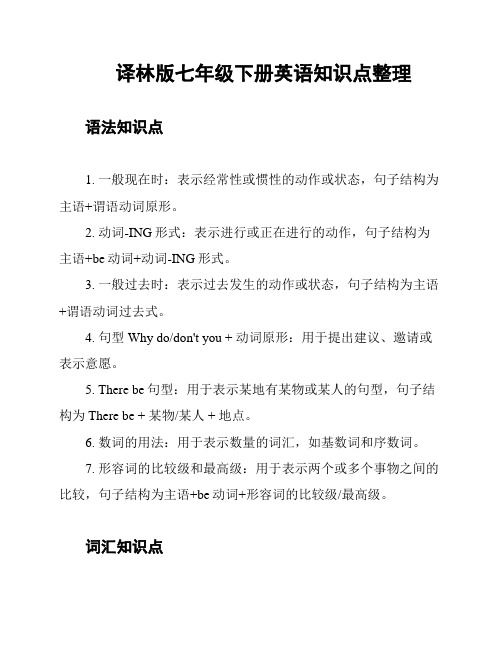
译林版七年级下册英语知识点整理语法知识点1. 一般现在时:表示经常性或惯性的动作或状态,句子结构为主语+谓语动词原形。
2. 动词-ING形式:表示进行或正在进行的动作,句子结构为主语+be动词+动词-ING形式。
3. 一般过去时:表示过去发生的动作或状态,句子结构为主语+谓语动词过去式。
4. 句型 Why do/don't you + 动词原形:用于提出建议、邀请或表示意愿。
5. There be句型:用于表示某地有某物或某人的句型,句子结构为There be + 某物/某人 + 地点。
6. 数词的用法:用于表示数量的词汇,如基数词和序数词。
7. 形容词的比较级和最高级:用于表示两个或多个事物之间的比较,句子结构为主语+be动词+形容词的比较级/最高级。
词汇知识点1. 日常用语:包括问候、告别、道歉、感谢、祝贺等常用语句。
2. 表示时间的词汇:包括星期几、月份、季节、日期等。
3. 数字词汇:包括基数词和序数词,用于表示数量和顺序。
4. 家庭成员和亲戚关系:包括父母、兄弟姐妹、叔伯姑舅以及堂兄弟姐妹等亲属关系词汇。
5. 线性短语:用于描述事物的特征或顺序,如形状、大小、颜色等。
写作技巧1. 书信写作:包括介绍自己、描述家庭、邀请朋友、写感谢信等常见书信写作题材。
2. 日记写作:描述个人的日常生活、感受和体验,可以记录一天的活动、一次旅行、一次特殊经历等。
3. 口头表达:训练口语表达能力,包括自我介绍、描述事物、陈述观点等口语交流技巧。
以上是《译林版七年级下册英语知识点整理》的内容概述,希望对你有所帮助。
七年级下英语知识点归纳译林
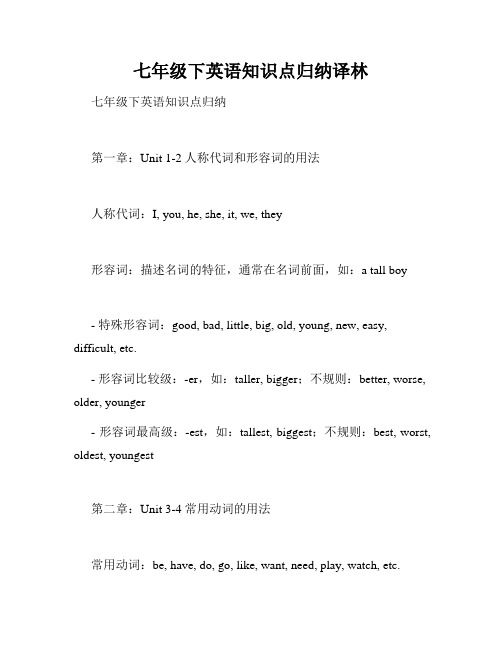
七年级下英语知识点归纳译林七年级下英语知识点归纳第一章:Unit 1-2 人称代词和形容词的用法人称代词:I, you, he, she, it, we, they形容词:描述名词的特征,通常在名词前面,如:a tall boy- 特殊形容词:good, bad, little, big, old, young, new, easy, difficult, etc.- 形容词比较级:-er,如:taller, bigger;不规则:better, worse, older, younger- 形容词最高级:-est,如:tallest, biggest;不规则:best, worst, oldest, youngest第二章:Unit 3-4 常用动词的用法常用动词:be, have, do, go, like, want, need, play, watch, etc.- be动词的用法:表示状态和身份,如:I am a student.- have动词的用法:表示拥有或体验,如:I have a pet cat. We had a great time.- 动词原形和动词第三人称单数形式:-s或-es第三章:Unit 5-6 数量词和时间的表达数量词:表示数量和程度的词语,如:many, much, few, little, some, any, several, a lot of, enough, too时间表达:表示时间的词语,如:hour, minute, second, day, week, month, year, birthday, etc.- 时间表达方式:am, pm, o'clock, in, on, at, from, to, etc.第四章:Unit 7-8 祈使句和情态动词的用法祈使句:表示命令、请求、建议和鼓励,如:Come here. Be happy. Do it now.情态动词:用于表达可能性、建议、意愿、能力、习惯和推测等,如:can, could, may, might, should, must, need- 情态动词后接动词原形,如:I can swim. You could help me.- 情态动词的否定形式:can't, couldn't, may not, might not, shouldn't, mustn't, needn't第五章:Unit 9-10 现在进行时和一般将来时的用法现在进行时:表示正在进行或发生的动作,如:I am watching TV.一般将来时:表示将来要发生的动作,如:I will go to Beijing next week.- 现在进行时的构成:be动词+动词-ing,如:am/is/are+reading - 一般将来时的构成:will/shall+动词原形,如:I will play basketball tomorrow.第六章:Unit 11-12 there be句型和过去时的用法there be句型:表示存在或发生的情况,如:There is a book on the desk.过去时:表示过去发生的动作或存在的状态,如:I played football last week.- there be句型的构成:there+be动词+主语,如:There aresome flowers in the garden.- 过去时的构成:动词过去式,如:played, went, saw, ate总结七年级下英语知识点归纳了从人称代词、形容词的用法到时间表达、现在进行时、一般将来时和过去时等常见的语法知识点。
七年级英语下册译林知识点
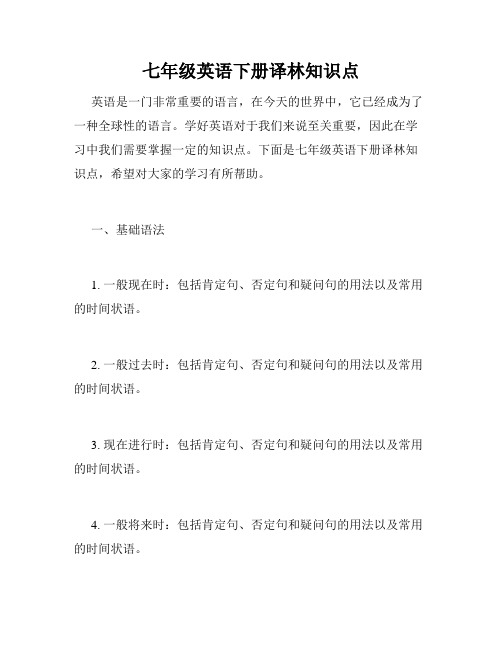
七年级英语下册译林知识点英语是一门非常重要的语言,在今天的世界中,它已经成为了一种全球性的语言。
学好英语对于我们来说至关重要,因此在学习中我们需要掌握一定的知识点。
下面是七年级英语下册译林知识点,希望对大家的学习有所帮助。
一、基础语法1. 一般现在时:包括肯定句、否定句和疑问句的用法以及常用的时间状语。
2. 一般过去时:包括肯定句、否定句和疑问句的用法以及常用的时间状语。
3. 现在进行时:包括肯定句、否定句和疑问句的用法以及常用的时间状语。
4. 一般将来时:包括肯定句、否定句和疑问句的用法以及常用的时间状语。
5. be动词的用法:包括肯定句、否定句和疑问句的用法以及常用的时间状语。
二、词汇1. 常用短语:包括问候语、道别语、日常用语和口语中经常使用的短语。
2. 常见动词:包括一般现在时、一般过去时、现在进行时和一般将来时中常见的动词。
3. 常见形容词:包括形容人和形容物体的常用形容词。
4. 常见名词:包括人、事、物等常用名词。
三、阅读技巧1.预测:在阅读之前,根据标题、图表和段落缩略图等信息做出一些合理的猜想。
2. 多读:多读一篇文章,可以帮助我们更好地理解文章的主旨和细节。
3. 抓关键词:在阅读过程中,应该注意关键词,这些词可以帮助我们更好地理解文章的意义。
4. 重复读:当我们对某些细节理解不清时,可以重复读几次来强化记忆,同时也可以更好地理解文章。
四、听力技巧1. 注意短语:在听力过程中,应该多注意短语的使用,这些短语可以帮助我们更好地理解对话和文章。
2. 纠正错误:如果我们在听力过程中听错了某些内容,应该及时纠正,避免影响我们对文章的理解。
3. 把握上下文:在听力过程中,应该注意上下文,可以通过上下文来推测某些词的意义。
4. 练习转述:听力结束后,我们可以试着将听到的内容转述出来,这可以帮助我们更好地记住听到的内容。
五、写作技巧1. 熟悉各种文章类型:包括议论文、说明文、叙事文和应用文等不同类型的文章。
七年级英语知识点归纳总结译林

七年级英语知识点归纳总结译林七年级英语知识点归纳总结一、语法知识点1. 一般现在时用于谈论经常性的、习惯性的行为、事实和真理。
构成:主语+动词原形。
2. 一般过去时用于谈论过去的事情或者动作。
构成:主语+动词过去式。
3. 现在进行时用于表示现在正在进行的动作或状态。
构成:主语+be动词+动词-ing。
4. 祈使句用于命令或请求别人做某事。
构成:动词原形。
如:Sit down.(坐下)5. 一般将来时用于表示将要发生的动作或状态。
构成:主语+will+动词原形。
6. be动词的用法表示状态:构成:主语+be动词。
如:I am happy.(我很开心)表示存在:构成:主语+be动词。
如:There is a cat.(有一只猫)表示职业、国籍、性别等特征:构成:主语+be动词+形容词。
如:He is a teacher.(他是一名教师)二、词汇知识点1. 数字one,two,three,four,five,six,seven,eight,nine,ten。
2. 常见颜色red(红色),blue(蓝色),yellow(黄色),green(绿色),pink(粉色),purple(紫色)。
3. 人体部位head(头),face(脸),eye(眼睛),nose(鼻子),ear(耳朵),mouth(嘴巴),hand(手),foot(脚)。
4. 常见动物dog(狗),cat(猫),pig(猪),duck(鸭子),chicken (鸡),monkey(猴子)。
5. 其他常见词汇school(学校),book(书本),pen(笔),desk(书桌),chair(椅子),bag(书包)。
三、听力技巧1. 记重点短时间内听到很多英语单词,要学会抓住关键要点,快速理解主旨,不要卡住细节。
2. 注意细节重点理解关键词,并注意数字、颜色、时间等细节。
3. 学会捕捉重复很多英语单词会在文章中反复出现,要学会捕捉这些重复出现的单词。
牛津译林版英语七年级下册units5-8期末复习重点知识点总结和试卷
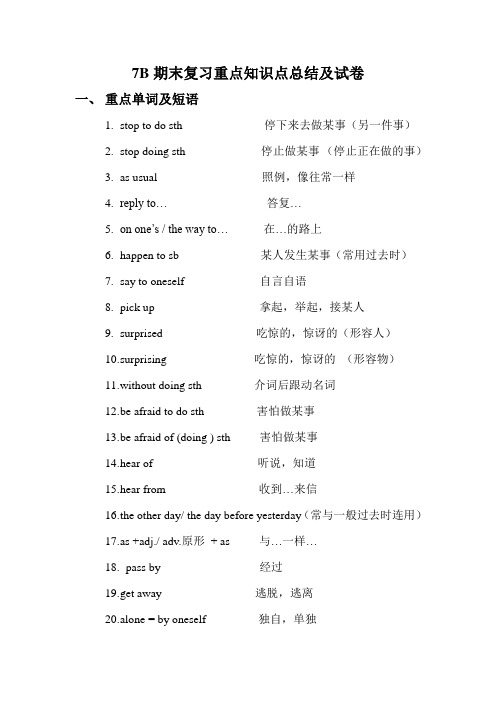
7B期末复习重点知识点总结及试卷一、重点单词及短语1.stop to do sth 停下来去做某事(另一件事)2.stop doing sth 停止做某事(停止正在做的事)3.as usual 照例,像往常一样4.reply to…答复…5.on one’s / the way to…在…的路上6.happen to sb 某人发生某事(常用过去时)7.say to oneself 自言自语8.pick up 拿起,举起,接某人9.surprised 吃惊的,惊讶的(形容人)10.s urprising 吃惊的,惊讶的(形容物)11.w ithout doing sth 介词后跟动名词12.b e afraid to do sth 害怕做某事13.b e afraid of (doing ) sth 害怕做某事14.h ear of 听说,知道15.h ear from 收到…来信16.t he other day/ the day before yesterday(常与一般过去时连用)17.a s +adj./ adv.原形+ as 与…一样…18.pass by 经过19.g et away 逃脱,逃离20.a lone = by oneself 独自,单独21.t hrough 穿过,通过(空间)go through 通过…22.p ut up 搭,竖立23.c entury ----centuries 世纪,百年24.e xcited/exciting 分别形容人和物25.e nough 足够的(放于名词前,形容词后)be enough to do sth26.t oo… to太…而不能…27.d ecide to do sth 决定做某事28.r each sth 伸手(脚)够到29.f ail to do sth 做某事失败30.s end sb sth= send sth to sb 发送…给…31.b e able to do sth= can/could 能/会做某事32.p ay for…为…付款33.r aise sth for sb 为…筹集/募集…34.r aise sth to do sth 募集…做某事35.s ave…from…从…救出…36.b e badly hurt 伤的很重37.p rotect…from doing sth保护…免于….38.p ut it out 把它扑灭(代词放中间)39.i n hospital 住院40.i n the hospital 在医院41.n od—nodded (过去式)点头42.n ews (不可数) 新闻,消息43.b y the way 顺便说说44.n o problem 没问题45.d o/try one’s best to do sth尽某人最大努力做某事46.c areful---careless(反义词)47.d o well in doing=be good at doing sth 擅长做某事48.a t the age of…在…岁的时候49.r ecommend sb for…推荐某人获得…50.t ake part in 参加(节目,游戏,活动)51.l ose one’s way = get lost迷路52.t each sb (代词用宾格)sth 教…(代词用宾格)53.t each sb to do sth 教某人做某事54.b ark at sb 对某人叫/吠55.l ook after…well=take good care of…照顾好…56.h ave trouble doing sth 做某事很困那/麻烦57.a ll the time 一直,总是58.a gree with sb 同意某人的观点agree to do sth 同意做某事59.w eigh up to…重达…60.g row up 成长,长大61.t alk= speech 演讲(可数)62.n oisy---noisily adv. 嘈杂的/地(变y为i加ly)期末复习试卷一、单项选择1. She is 11-year-old girl and enjoys playing chess.A. an; anB. a; theC. an; /D. the; /2. Everybody is too tired. Let's a rest.A. stop havingB. to stop havingC. stop to haveD. stop to have3. He was to hear of the news this morning.A. surprising; surprisedB. surprised; surprisingC. surprised; surprisedD. surprising; surprising4.She met her old friend the other day.A. on her way to homeB. on her way homeC. in my way homeD. in my way to home5.The big fire in Australia was at last.A. put inB. put outC. put upD. put down6.Lots of students couldn’t hear the teacher on Ding ding(钉钉)A. enough clearlyB. clearly enoughC. enough clearD. clear enough7.The sunshine went the window, so the whole room was bright.A. acrossB. overC. throughD. past8.--- I can’t reach the book on the shelf, can you help me?--- .A. Never mindB. No problemC. That's all rightD. That's OK9.He did n’t ___________ his pen-friend and he missed her very much.A. heard fromB. hear ofC. heard ofD. hear from10.Many people have _ to do because of the disease Corona vi(新型冠状病毒).A. everythingB. somethingC. anythingD. nothing11.Doctor Zhong nanshan says it still _______ long time to cure(治愈) the diseaseA. spendB. costC. payD. take12.The Eiffel Tower, a ____________ tower, is 130 years old this year.A. 324 metres tallB. 324-metres-tallC. 324-metre-tallD. 324-metre tall13.She felt very sad because she ___________ in the middle-term exam.A. reachedB. failedC. hitD. entered14.The small giraffe is too short the leaves on the tree.A. to reachingB. to reachC. reachingD. not to reach15. good news! The doctors found the medicine to cure the disease!A. HowB. What aC. WhatD. How a二、完形填空阅读下面短文,掌握其大意,从每题所给的A. B. C. D四个选项中,选出最佳选项。
牛津译林英语七年级下册全册知识点汇总
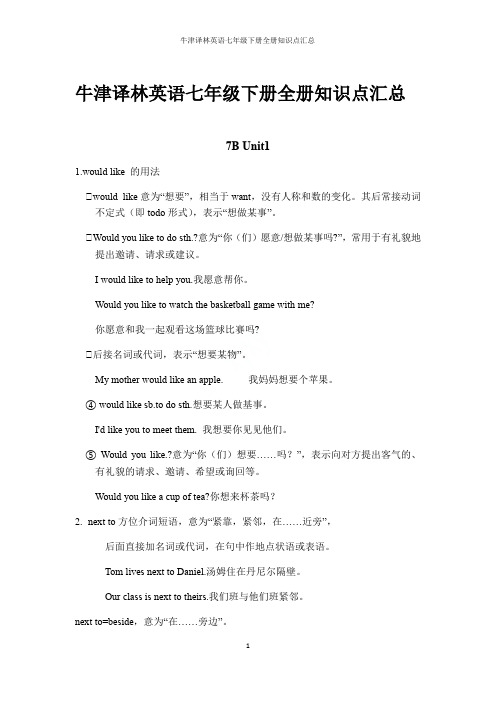
牛津译林英语七年级下册全册知识点汇总7B Unit11.would like 的用法①would like意为“想要”,相当于want,没有人称和数的变化。
其后常接动词不定式(即todo形式),表示“想做某事”。
①Would you like to do sth.?意为“你(们)愿意/想做某事吗?”,常用于有礼貌地提出邀请、请求或建议。
I would like to help you.我愿意帮你。
Would you like to watch the basketball game with me?你愿意和我一起观看这场篮球比赛吗?①后接名词或代词,表示“想要某物”。
My mother would like an apple. 我妈妈想要个苹果。
④ would like sb.to do sth.想要某人做基事。
I'd like you to meet them. 我想要你见见他们。
⑤Would you like.?意为“你(们)想要……吗?”,表示向对方提出客气的、有礼貌的请求、邀请、希望或询回等。
Would you like a cup of tea?你想来杯茶吗?2.next to方位介词短语,意为“紧靠,紧邻,在……近旁”,后面直接加名词或代词,在句中作地点状语或表语。
Tom lives next to Daniel.汤姆住在丹尼尔隔壁。
Our class is next to theirs.我们班与他们班紧邻。
next to=beside,意为“在……旁边”。
My home is next to our school.=My home is beside our school.我家靠近我们的学校。
3.in town 在城里,在镇上in the town 在这座城里,the 表示特指4.Your watch is very beautiful.I want to buy one,too. 你的手表很漂亮,我也想买一块。
译林版七年级下英语各单元知识归纳
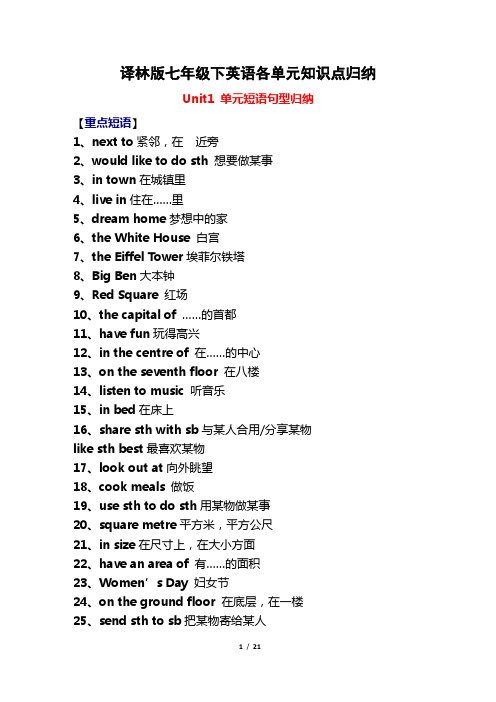
译林版七年级下英语各单元知识点归纳Unit1 单元短语句型归纳【重点短语】1、next to紧邻,在近旁2、would like to do sth 想要做某事3、in town在城镇里4、live in住在……里5、dream home梦想中的家6、the White House 白宫7、the Eiffel Tower埃菲尔铁塔8、Big Ben大本钟9、Red Square 红场10、the capital of……的首都11、have fun玩得高兴12、in the centre of 在……的中心13、on the seventh floor 在八楼14、listen to music听音乐15、in bed在床上16、share sth with sb与某人合用/分享某物like sth best最喜欢某物17、look out at向外眺望18、cook meals 做饭19、use sth to do sth用某物做某事20、square metre平方米,平方公尺21、in size在尺寸上,在大小方面22、have an area of 有……的面积23、Women’s Day妇女节24、on the ground floor在底层,在一楼25、send sth to sb把某物寄给某人26、be different from与……不同27、be full of满的,充满的28、of one’s own属于某人自己的29、hope to do sth希望做某事30、some day将来有一天,总有一天31、answer the phone接电话32、make a phone call 打电话33、take a message传个话,捎个口信34、ask sb to do sth请/叫某人做某事35、call sb back回某人电话36、telephone number电话号码37、more than超过,多于38、one of………之一39、practice doing sth 练习做某事40、take turns to do sth轮流做某事41、at the foot of 在……脚下42、a home cinema家庭影院43、invite sb to do sth邀请某人做某事44、on the first floor 在一楼【典句必背】1、Which country is this photo from, Simon? 西蒙,这张照片来自哪个国家?2、Is Tokyo the capital of Japan? 东京是日本的首都吗?3、I always have fun with my dog there.在那里我总是和我的狗玩得很开心。
【2020最新】译林版【初一英语】期末知识点总结(下册)
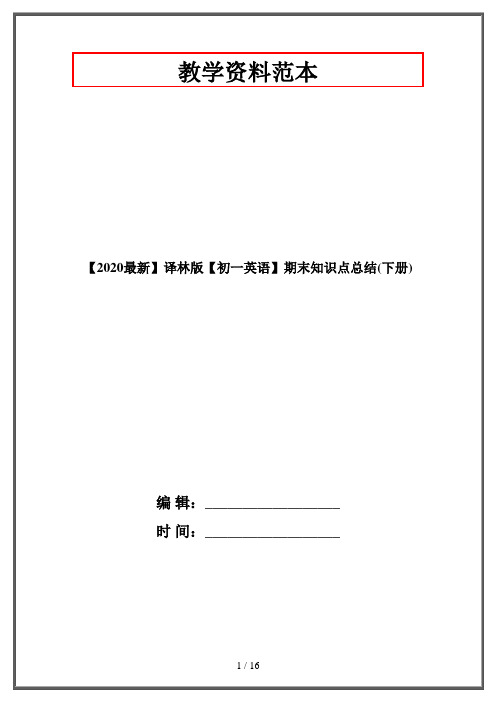
用树叶( leaf )做的小刀( knife ),
杀死了一只狼( wolf ),
把它劈成两半( half ),
挂在衣架上( shelf )。
12. thanks for sth./doing sth.
= thank sb. for doing sth. 因为 …… 而感谢某人
8 、 I l ove to sit there and look out at the beach and the sea.
我喜欢坐在那里向外看海滩和海。
look out at sth 向外看 ……
look out of… 看 …… 的外面
look out 向外看,小心
Q : It ’ s good for your eyes to ______________ the green
This is Daniel speaking.=Speaking. 表示某人正在接电话。
Is that Tom speaking? 那是 Tom 吗?
16. Can you ask him to call me back? 你能让他给我回电话吗?
ask sb. to do sth. 叫某人去做某事
7 、 We often listen to music in bed. 我们经常躺在床上听音乐。
① in bed 意为 ( 躺 ) 在床上, bed 前无冠词修饰。
Don't read ________________. 不要躺在床上看书。
② on the bed 表示某样东西在床上。
There is a book ____________. 床上有本书。
6 、 My favourite room is the kitchen.
- 1、下载文档前请自行甄别文档内容的完整性,平台不提供额外的编辑、内容补充、找答案等附加服务。
- 2、"仅部分预览"的文档,不可在线预览部分如存在完整性等问题,可反馈申请退款(可完整预览的文档不适用该条件!)。
- 3、如文档侵犯您的权益,请联系客服反馈,我们会尽快为您处理(人工客服工作时间:9:00-18:30)。
七年级下册知识点总结Unit 1 Dream homes一、重点词组、句型1、Would you like to live in the palace, Eddie 埃迪,你想住宫殿里吗①Would you like sth 肯定回答: Yes, please. 否定回答: No,thanks.②Would you like to do sth 肯定回答:Yes, I’d like/love to. 否定回答:I’d like/love to, but…2、There are twenty restaurants in town. 镇上有二十家餐馆。
There are about 8,000,000 people living in London. 大约有八百万人住在伦敦。
①表示某地有……,用there be 句型,谓语动词就近原则。
There __________(be) an art room, a music room and two computer rooms in our school.②表示有事情要做,用there be sth to do。
There are lots of things___________(see) in Beijing..③表示有某人正在做某事,用there be sb doing sth.。
On game shows, there are always famous people___________(talk) about their lives.3、I live in a town 15 miles from London. 我住在离伦敦15英里的一个镇上。
be far (away) from 离……远,但出现具体距离时,不用farMy home is __________________from the school.My home is 5 kilometres ___________from the school. A. away B.far C. close D. next to4. have fun with sb./sth. 和某人/某物玩得开心have fun doing sth. 做某事很开心have(has/had) fun= have(has/had) a good time= enjoy(enjoyed) onself(myself/yourself/youselves……)5、I also have a bedroom of my own. =I also have my own bedroom. 我也有自己的房间。
own ①(adj.) 自己的用于形容词性物主代词或名词所有格后,加强语气②(vt.) 拥有 owner (n.) 物主,所有人He______________(own) a big company in New York.He is the______________(own) of a big company in New York.6、I share a bedroom with my sister. 我和妹妹共享一间卧室。
share sth. with sb. 和某人共享……7、We often listen to music in bed. 我们经常躺在床上听音乐。
①in bed 意为(躺)在床上,bed 前无冠词修饰。
Don't read ________________. 不要躺在床上看书。
②on the bed 表示某样东西在床上。
There is a book ____________. 床上有本书。
8、I Love to sit there and look out at the beach and the sea. 我喜欢坐在那里向外看海滩和海。
look out at sth 向外看…… look out of… 看……的外面 look out 向外看,小心It’s good for your eyes to ______________ the green trees for a minute or two.A. look out ofB. look out atC. look out fromD. look for atlook like 看起来像 look up 查阅(字典/资料),向上看 look after 照顾 look for 寻找(强调动作)in the sea 在海里 by sea= by ship坐船 by the sea 在海边9、Your house is really different from the flats here in our town. 你的房子和我们城镇里的公寓真的很不一样。
be different from… 和……不同,不同于…… be the same as……和……相同different 是形容词,名词为differenceOur classroom is different from___________(he ).There are some _____________(different) between the four words.10、Each room has a new computer. 每间房间都有台新电脑。
each 用于两者及以上的每一个,后面可以直接跟of。
如each of them/you/usevery 用于三者及以上的每一个,后面不能直接跟 of,如要表示每一个,可用 every one。
如every one of them/you/usEach student __________________(have) a book in his hand.Each of the students__________________(have) a book in his hand.The students each__________________(have) a book in his hand.11. knife n.刀子,小刀其复数为kniveswife(妻子),wolf(狼),shelf(架子),thief(小偷),leaf(树叶),life(生命)12. thaks for sth./doing sth.= thank sb. for doing sth. 因为……而感谢某人Thank you for helping me.= Thanks for helping me.=Thank you/Thanks for your help.13. Your garden is full of flowers.你的花园里都是花。
be full of……= be filled with…… 充满着……14. I hope to visit your home some day.我希望有一天能去拜访你家。
hope to do sth.希望去做某事hope +(that)从句,上句等于I hope I can visit your home some day. 常用I hope you have a good time.some day 将来有一天,总有一天只用来指将来one day 某一天可以指过去,也可以指将来the other day 前几天常用于一般过去时He writes such wonderful stories that he _____________(make) a good writer some day.I______________(happen) to meet him in the street the other day.15. May I speak to Daniel, please 我可以找Daniel接电话吗打电话时,常用this/that来指代说话双方,直到相互知道身份,常用:This is Daniel speaking.=Speaking. 表示正是某人在接电话。
Is that Tom speaking那是Tom吗16. Can you ask him to call me back你能让他给我回电话吗ask sb. to do sth. 叫某人去做某事 ask sb. not to do sth. 叫某人不要去做某事ask (sb.) for sth. (向某人)要某物17、I would like to invite my friends to watch films with me at the weekend. 在周末,我想邀请朋友来看电影。
invite (v.) 邀请invitation (n) 邀请an invitation letter 一封邀请函invite sb to someplace 邀请某人去某地或参加活动invite sb to do sth 邀请某人去做某事18、have an area of over 260,000 square miles 占地260,000多平方英里91,000 square meters in size 91,000平方米的面积squar e ①adj. 平方的square metre 平方米②n.广场Tian’an men Square 天安门广场(一)基数词构成及读法1、1-12为独立的单词,有其各自的形式one, two, three, four, five, six,seven, eight, nine, ten, eleven, twelve2、13-19都以teen结尾 thirteen, fourteen, fifteen, sixteen, seventeen, eighteen, nineteen3、20-90之间的“整十”都以ty结尾 twenty, thirty, forty, fifty, sixty, seventy, eighty, ninety4、20-99之间的“几十几”,先说“几十”,再说“几”,且中间加连词符。
如:22 twenty-two, 49 forty-nine, 94 ninety-four5、101-999之间的非整百的基数词读法为:百位数和十位数(或个位数)之间用and连接。
如:608 six hundred and eight, 732 seven hundred and thirty-two6、四位数及以上的基数词读法为(二)基数词的部分用法1、表顺序。
由单数名词 + 基数词,此时名词和基数词第一个字母大写。
